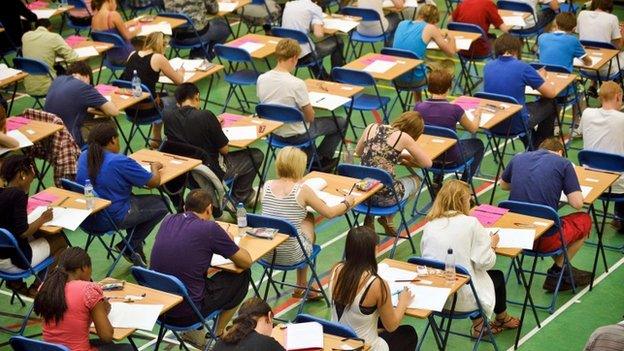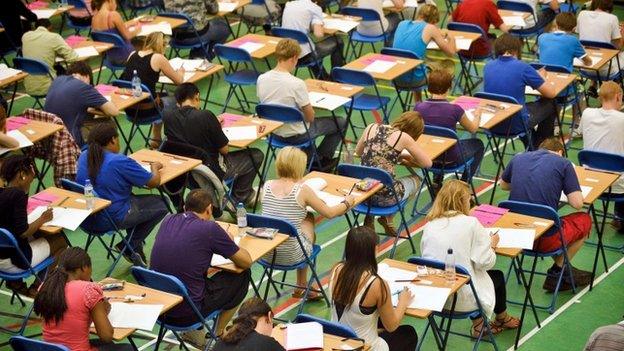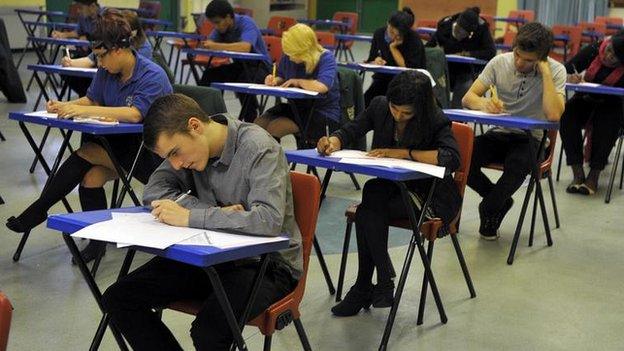Exam regulator clamps down on re-marks
- Published

Record numbers of grades were changed after re-marking last year
England's exams regulator is clamping down on the "unfair advantage" gained by some schools which seek high numbers of GCSE and A-level re-marks.
Ofqual is changing its system this summer, so that new marks can only be issued if a "marking error" is found.
Their research shows independent schools seek twice as many GCSE reviews as comprehensive schools request.
But Chris King, chairman of the independent schools body the HMC, said the system would be less fair.
And heads from the ASCL union said there were often concerns over the initial quality of the marking.
Most reviews led to slightly higher marks, Ofqual said, penalising pupils from schools which did not ask for re-marks.
It said the change would mean a "level playing field".
Independent schools sought reviews for one in eight A-level grades, more than twice the proportion of state-funded colleges, it added.
Exam boards charge fees of between £20 and £72 per paper to be re-marked, but refund the fee if the grade changes. These costs are generally borne by the school, but some state schools ask parents to pay.
'Second bite of the cherry'
Overall more than 90,000 A-level and GCSE results were changed on appeal in 2015 - an increase of 17% in one year and the highest on record.
Julie Swan, Ofqual's executive director for general qualifications, said it was clear from its analysis that the current system could be fairer.
"It is not fair to allow some students to have a second bite of the cherry by giving them a higher mark on review, when the first mark was appropriate," she said.
"This undermines the hard work and professionalism of markers, most of whom are teachers themselves.
"These changes will mean a level playing field for all students and help to improve public confidence in the marking system.
"We want schools to be able to ask for a review if an error has been made. Nothing we are doing will make it any more difficult for a marking error to be corrected."
'Right mark?'
Ofqual highlighted that re-marks resulted in changes upwards by just a few marks and this was down to the subjective nature of marking.
There was a common misconception that there was a single "right mark" for more extended questions, it said.
The changes, which will take effect from this summer, have followed a consultation with schools, teachers, subject associations and students.
Other changes include:
Exam boards must monitor reviewers to ensure a consistent approach
AS and A-level scripts must be made available to schools before they have to decide on whether to submit a review
They will be able to choose to do the same for GCSE scripts
Exam boards will have to set out the reasons why a result has or has not been changed
The Association of School and College Leaders said the changes would be hugely contentious because many people believe that the initial quality of marking is not always up to scratch in the first place.
"There remains an underlying problem in that the system is still something of a cottage industry in which teachers mark huge numbers of scripts in their spare time for little pay. It needs to be better resourced and better structured.
"The most important thing is to have a system that gets marks right first time."
HMC chairman Chris King said the changes would make the proper review when marks and grades are challenged by schools and colleges less clear, less consistent and less fair.
"We are especially concerned that the proposals do not commit the regulator to ensuring that each candidate passing through the exam system has their papers marked and graded with the necessary high levels of consistency and precision," he said.
"Without this, all claims about fairness ring very hollow."
Russell Hobby, general secretary of the National Association of Head Teachers, said: "The new test to be applied to exam marks and to grades that are challenged - that they are merely 'reasonable' - makes things more vague than they already are."
- Published18 March 2016

- Published10 December 2015

- Published14 October 2015
